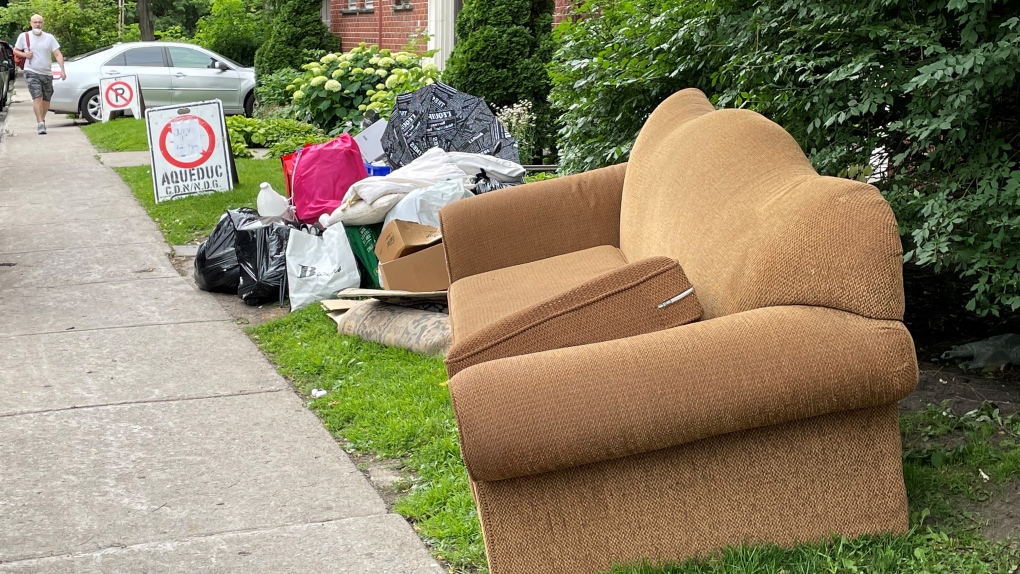Bed bug basics: How to prevent them, how to find them, and what to do if you have them
Summer is moving season in Montreal. It's also the season when the most unwanted of roommates -- bed bugs -- are at their peak.
Don Prashker is the owner of Thermapro Solutions, a Montreal company that specializes in bed bug extermination.
He shared a few tips to keep in mind this summer, whether you're trying to avoid bed bugs or already have them in your space.
LEAVE CURBED FURNITURE ON THE CURB
According to Prashker, the easiest way to deal with bed bugs is to prevent them from entering your home in the first place.
The insects are particularly common in apartment buildings as they can easily migrate from one unit to the next -- but they can also hitchhike from faraway places.
One common mode of transportation is used furniture, which can be a major gamble when it comes to bugs, especially when that furniture is picked up on the side of the road.
 Moving day in Montreal means piles of furniture and other discarded items along the streets. (Touria Izri/CTV News)
Moving day in Montreal means piles of furniture and other discarded items along the streets. (Touria Izri/CTV News)
"There's a lot of furniture being left out on curbsides and on corners," he said. "People are literally collecting that, bringing that into their own home, and this is a great way to get bedbugs."
THE TRUTH IS IN THE POOP
But what about the furniture you already own -- how can you tell if there's an issue?
"Bed bugs always leave their calling cards, and that's their poop," says Prashker.
"They're black little dots, like someone took a toothbrush, dipped it in ink, and kind of spritzed it on the mattress."
 (File image)
(File image)
These speckles will often appear on the seams of the mattress or even on bedsheets.
When you move into a new place, search for these telltale stains around baseboards and electrical outlets, as their presence could indicate an infestation that's been around for a while.
Bugs sometimes relocate to these areas after the furniture has been sprayed with over-the-counter treatments, Prashker explains.
DITCH THE DIY METHODS
Speaking of which, Prashker says do-it-yourself treatments should be avoided if possible.
He says the trick to getting rid of bed bugs is by baiting them, not repelling them, which is why he recommends professional heat treatments over common chemicals.
"Please be careful when using over-the-counter products," he said. "They tend to be repellents, and you don't want to repel bed bugs. That's just pushing the problem from one unit to the next."
Instead, he recommends hiring professionals who can pump heat into the rooms and "literally cook" its contents, killing the bugs.
"Bed bugs are instinctively attracted to heat, so they come towards the heat treatment," he explains. "We just continue to crank up the heat everywhere until it's universal, and there's nowhere for the bed bugs to go."
When moving to a new place, he says tenants should keep an eye out for signs of treatments past.
"If you see any pesticides or residuals or traps, these are good signs to ask the landlord what was going on."
ACT FAST
Take action soon as you spot the signs, Prashker advises.
"The earlier you get on top of a bed bug problem, the easier it is to solve," he says. "It's a lot easier to kill five of them than it is to kill 5,000 of them."
If you don't address it right away?
"Within three months, you'll have an infestation. Within six months you'll have more eggs than you do bugs."
BUST THE STIGMA
The biggest way to prevent the spread of bed bugs is by addressing the shame that comes with them, according to Prashker.
"There's a huge psychological stigma to this problem," even though bed bugs don't necessarily indicate a lack of hygiene or a dirty home.
He says reluctance to openly discuss the issue hinders the implementation of protocols that could slow the spread.
When a child has lice, for example, school administration sends out a letter to parents informing them -- but these same measures don't exist for bed bugs.
"So kids are coming to school when they have bed bugs at home, and three more kids are now bringing them home as well."
--With files from CTV's Touria Izri
CTVNews.ca Top Stories

B.C. tenants evicted for landlord's use after refusing large rent increase to take over neighbouring suite
Ashley Dickey and her mother rented part of the same Coquitlam duplex in three different decades under three different landlords.
MPP Sarah Jama asked to leave Ontario legislature for wearing keffiyeh
MPP Sarah Jama was asked to leave the Legislative Assembly of Ontario by House Speaker Ted Arnott on Thursday for wearing a keffiyeh, a garment which has been banned at Queen’s Park.
Mountain guide dies after falling into a crevasse in Banff National Park
A man who fell into a crevasse while leading a backcountry ski group deep in the Canadian Rockies has died.
Expert warns of food consumption habits amid rising prices
A new survey by Dalhousie University's Agri-Food Analytics Lab asked Canadians about their food consumption habits amid rising prices.
Here's why provinces aren't following Saskatchewan's lead on the carbon tax home heating fight
After Prime Minister Justin Trudeau said the federal government would still send Canada Carbon Rebate cheques to Saskatchewan residents, despite Saskatchewan Premier Scott Moe's decision to stop collecting the carbon tax on natural gas or home heating, questions were raised about whether other provinces would follow suit. CTV News reached out across the country and here's what we found out.
Montreal actress calls Weinstein ruling 'discouraging' but not surprising
A Montreal actress, who has previously detailed incidents she had with disgraced Hollywood producer Harvey Weinstein, says a New York Court of Appeals decision overturning his 2020 rape conviction is 'discouraging' but not surprising.
Charlie Woods, son of Tiger, shoots 81 in U.S. Open qualifier
Charlie Woods failed to advance in a U.S. Open local qualifying event Thursday, shooting a 9-over 81 at Legacy Golf & Tennis Club.
Caleb Williams, Jayden Daniels and Drake Maye make it four NFL drafts with quarterbacks going 1-3
Caleb Williams is heading to the Windy City, aiming to become the franchise quarterback Chicago has sought for decades.
Improve balance and build core strength with this exercise
When it comes to cardiovascular fitness, you may tend to focus on activities that move you forward, such as walking, running and cycling.

































